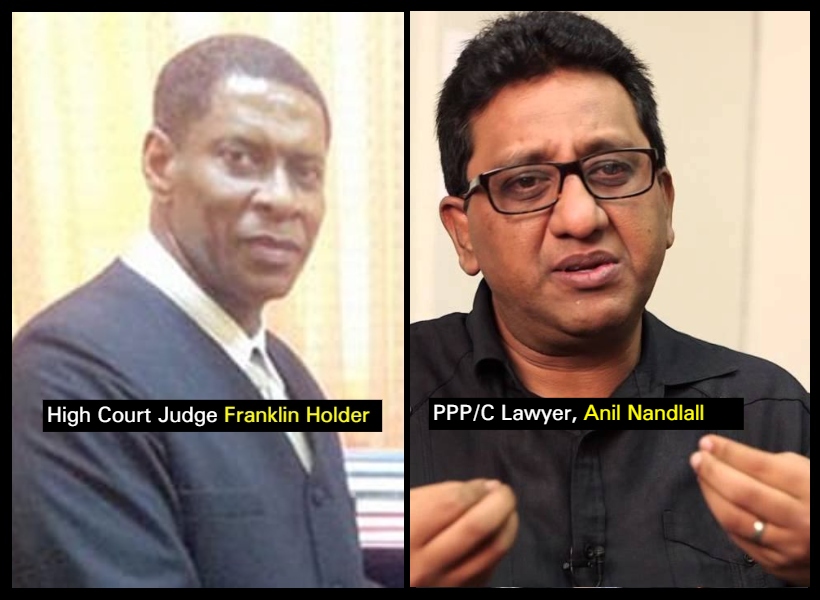A hearing in an injunction filed by APNU+AFC candidate Ulita Moore, which has blocked a CARICOM-supervised national recount of the votes cast in the March 2 General and Regional Elections, was met with a setback this afternoon. Lawyers for the PPP/C, Trinidad-based Senior Counsel Douglas Mendes and Anil Nandlall, are contending that Justice Franklin Holder, before whom the matter was assigned, has no jurisdiction to hear it.
In raising this issue, the lawyers countered an argument by Senior Counsel Neil Boston, who is representing the Chief Elections Officer, (CEO), Keith Lowenfield and Region Four’s Returning Officer, Clairmont Mingo.
In that argument, Boston contends that the Judge has no jurisdiction to hear an application filed by Leader of the Opposition Bharrat Jagdeo, in which he is asking the court to order Lowenfield to disclose all the Statements of Polls (SoPs) for Region 4.
Speaking with reporters after this afternoon’s hearing, Nandlall explained that the basis for Jagdeo’s application is to assist the court in dealing with the controversy which erupted from Mingo’s tabulation of Region 4 votes. He reminded that Mingo did not use SoPs, but rather a spreadsheet, to tabulate the votes, after which he made a purported declaration.
Nandlall said, “We thought it would be in the best interest of justice and in the best interest of everyone to not have the Returning Officer’s SoPs but the SoPs in the possession of the [CEO]. These are SoPs under the law, that goes directly to the [CEO] from the Presiding Officer at the close of polls. So those SoPs would not have been contaminated in any form or fashion, by anything done by the Returning Officer…We felt those would have been the most cleanest, most genuine SoPs that can be used to resolve the issue of the controversy.”
Nandlall, a former Attorney General, also went further in accusing Lowenfield of taking sides with Moore.
In fact, he said that one would expect in any ordinary circumstances that the CEO, being part of an impartial body [GECOM], and also being the statutory officer and the custodian of all documents in relation to the elections,that he would have been most anxious and most willing to allow the SoPs to be scrutinised by everyone, including the court in order to arrive at a solution to the controversy.
But this is definitely not what is happening, Nandlall informed reporters just outside the courthouse.
“Unfortunately, the CEO takes a position that is totally inconsistent with that. The CEO resists allowing his SoPs to be used. And another important point is that the CEO, by the arguments advanced, is on the side of Ulita Moore, which should not be.”
If there is an impartial body before the court, Nandlall stated it should be GECOM and the CEO.
“The nation knows that Ulita Moore is representing the interest of the APNU+AFC. I don’t think anybody is being fooled anymore with that camouflage… that mask has been removed. So you have the [CEO] taking positions before the court that are consistent with Ulita Moore; and you have Ulita Moore resisting the court directing the CEO to produce [his] SoPs.”
Nandlall said it was Moore’s lawyers, including two former Attorney General from Caribbean states, who raised the argument of whether the court can order the CEO to produce the SoPs. In response, Nandlall disclosed that he and Senior Counsel Mendes said at some point in time the court will have to address itself as to whether it could hear Moore’s matter.
“Because that matter questions decisions made by the Elections Commission under Section 140 of the Representation of the People Act.” According to him, the decisions made under the aforesaid provisions is “precluded from inquiry by any court.”
He explained, “So you have a jurisdictional bar created by the Representation of the People’s Act against a court inquiring into decisions made by GECOM. And Ulita Moore’s entire case rests upon asking the court to overrule decisions made by GECOM and to inquire into how those decisions were made and those things cannot be inquired into according to the Representation of the People Act.”
Nandlall said, too, that if the court finds it has no jurisdiction to deal with Moore’s matter, then the application for Lowenfield to produce to SoPs cannot stand because it is connected to that matter. Notwithstanding this, Nandlall is arguing that should the court rule it has jurisdiction to hear Moore’s application, then it can demand Lowenfield to produce the SoPs.
Moreover, Nandlall has dismissed arguments by Boston who is contending that an application for disclosure of the SoPs can only be done by way of an elections petition. According to Nandlall, by statute, the same way in which Mingo’s decisions, conduct and tabulation of the exercise was inquired into by the Chief Justice; the same can be done for the SoPs.
“The same statute that gave the Chief Justice jurisdiction to question his declaration on March 5, obviously is the same statute that will give this court jurisdiction to inquire into his decision on March 13 [when Mingo made a second declaration]. It is trying to understand how he ascertained the number of votes cast for each List of Candidates.”
“If he [Mingo] is saying that the SoPs are the basis for his adding up and his numbers are different from the numbers in the SoPs for the other parties, one of the best ways of resolving that dispute is to get neutral SoPs which are in the possession of the Chief Elections Officer.”
He continued, “If Lowenfield’s SoPs are produced it can easily established that [Mingo] was not using the SoPs. He had to have been getting those numbers from some other source. The court will continue hearing arguments in these matters on Friday. In the meantime, the parties were ordered to file submissions.













